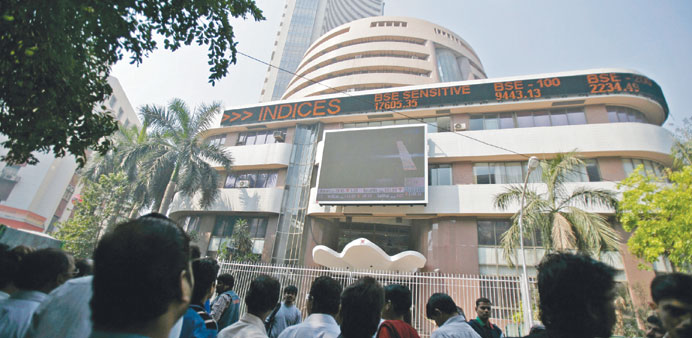Reuters
Indian shares fell yesterday to their lowest close in a week, as profit-taking hit shares of blue-chips such as ICICI Bank for a second consecutive session after the record highs of last week.
Caution also prevailed ahead of the expiry of monthly derivatives contracts due on Thursday and ahead of key earnings such as Bharti Airtel and ICICI Bank in a holiday-shortened week.
The US Federal Reserve’s monetary policy statement tomorrow is also on watch, especially for interest-rate outlook and any risk aversion towards emerging markets like India.
“The week is chock-a-block with economic events. If the Nifty (NSE index) manages to close above the 7,850 mark, which presently looks difficult, we can possibly gun for the 8,050 mark. Support is at 7,650,” said Jyotheesh Kumar, executive vice-president of HDFC Securities.
The central bank’s monetary policy review on August 5 would be the next big trigger for Indian shares, which have rallied nearly 23% so far this year on optimism around reforms from the newly elected Narendra Modi government.
The broader NSE index lost 0.54%, or 41.75 points, to end at 7,748.70. It hit a record high of 7,840.95 on Friday. The benchmark BSE index fell 0.52%, or 135.52 points, to end at 25,991.23, closing below the psychologically important 26,000 level.
Both indexes marked their lowest close since July 21. ICICI Bank fell 1.5% after gaining over 34% in 2014 till Friday’s close, while Reliance Industries ended down 1.6%.
Among other blue-chips, Tata Steel fell 1.7%, while Power Grid Corp of India lost 1.2%.
Engineering company Larsen and Toubro fell 1% ahead of its June-quarter results later in the day. The company later said its April-June net profit more than doubled to Rs9.67bn.
Other recent outperformers also fell. Housing Development Finance Corp ended 0.1% lower, while Kotak Mahindra Bank fell 0.4%.
Tata Motors fell 1.6%, adding to Friday’s 5% decline after its unit Jaguar Land Rover said it would cut prices of three models in China due to the
government’s anti-monopoly probe.
Havells India fell 2.1% after April-June earnings lagged estimates as additional depreciation due to changes in the Companies Act and expiry of certain tax exemptions weighed on results.
Among the gainers, Hindustan Unilever rose 3.5% after better-than-expected volume growth in the April-June quarter translated into earnings that beat estimates.
Bank of Baroda gained 0.5% after posting better-than-expected quarterly earnings of Rs13.62bn, helped by lower non-tax provisions and improved net interest income.
The rupee closed marginally weaker yesterday, marking another sluggish session as dollar demand from importers to meet month-end commitments was offset by greenback sales from custodian banks.
The central bank is also stepping-in to buy dollars when the rupee strengthens, further capping gains. Data late on Friday showed India’s foreign exchange reserves rose to $317.85bn as of July 18, the highest since October 2011.
Traders expect the rupee to remain in a narrow range, unless global events flare up. This week analysts will look for US-focused action, including the two-day Federal Reserve meeting ending tomorrow and non-farm payrolls figures on Friday.
“We expect the pair to remain in a very narrow range for the near term as all the fund flows are getting absorbed easily in the market,” said Unnati Parekh, head of currency derivatives at KanjiForex, a forex brokerage in Mumbai.
She predicted a range of 60.05 to 60.35 for the week, barring major international shocks.
The partially convertible rupee closed at 60.1250/1350 per dollar, compared with 60.1025/1125 on Friday.
The local currency market will remain closed today on account of a holiday.
The rupee has remained supported as foreign portfolio investors have invested $5.18bn in local shares and debt so far in July.
India’s 50-share NSE Nifty fell 0.5% yesterday, as profit-taking hit shares of blue-chips such as ICICI Bank for a second consecutive session after the record highs of last week.
In the offshore non-deliverable forwards, the one-month was at 60.31, while the three-month was at 60.78.

